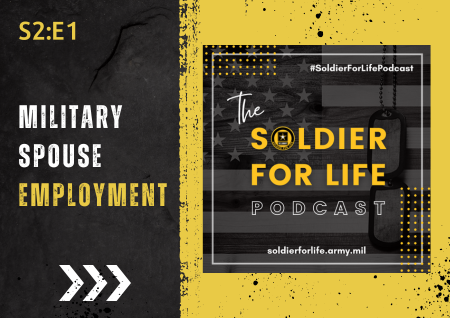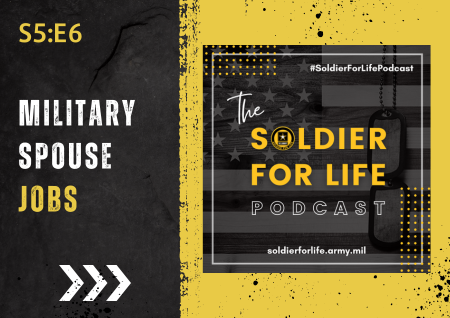- What does your Spouse want to do?
(Be sure your Spouse also begins preparation for life after military retirement at least 36 months out as some of these programs are only available while you are on active duty or up to one year following your retirement date.)
-
- Will your Spouse continue or pursue a career? Research the programs available to assist spouses in the job search.
- Military Spouse Transition Program (MySTeP)
- Military Spouse Employment Partnership
- Army Employment Readiness Program
- Army Spouse Employment, Career and Education
- Special Hiring Authorities for Spouses of Active Duty Military Members seeking Federal employment
- U.S. Department of Veterans Affairs Career and Employment Resources for Military and Veteran Family Members
- U.S Department of Labor Veterans' Employment and Training Service Resources for Military Spouses
- Opportunities through other organizations
- Use LinkedIn to to network and let others know you are interested in employment.
- Connect with companies and organizations where you are interested in working.
- Connect with colleagues and friends.
- Connect with people who work in the industries you are considering or at the companies you are interested in joining.
- Will your Spouse continue or pursue a career? Research the programs available to assist spouses in the job search.
-
- If your Spouse has professional licenses to transfer to another state view these resources:
- Look up license requirements by state
- Department of Labor Military Spouse Interstate License Recognition Options
- Look into programs that assist with licensing costs to eligible Spouses (the move would need to be completed prior to the Soldier leaving active duty).
- Spouse Licensure Reimbursement Policy when transferring a professional license to a new state
- Additional financial assistance for relicensing is available to eligible spouses from Army Emergency Relief.
- If your Spouse has professional licenses to transfer to another state view these resources:
-
- Is your spouse going back to work after a long career break?
- Look for “returnship” programs and opportunities with potential employers.
- Research organizations that specifically help those returning to work. There are temporary, permanent and remote positions available. Some offer a free returning to work kit of information to help get started. [Disclaimer: The information below is not a partnership or endorsement of non-federal entities by the US Soldier for Life Program, the Army Retirement Services Office, the US Army or DoD. This is for informational use only.]
- Is your spouse going back to work after a long career break?
-
- Does your Spouse want to pursue educational opportunities?
- Military Spouse Education and Career Opportunities (SECO)
- Army Spouse Employment, Career and Education
- Army MWR Employment Readiness Program
- Education and Employment for Spouses
- There are scholarships available to Spouses and children of Service Members.
- Review the MyArmyBenefits State/Territory Fact Sheets for information on scholarships offered by individual states.
- Review the following MyArmyBenefits Federal Fact Sheets on specific scholarship programs:
- Many other scholarships are available to Spouses and children of Retired Soldiers. Check out the Resources and Links page on the Soldier For Life website for more organizations that offer educational opportunities and scholarships.
- Does your Spouse want to pursue educational opportunities?
- Mentoring is important for Spouses of retiring Soldiers.
- Find a mentor in your community or another military spouse that has been through the retirement experience.
- Try ACP or other online mentoring programs.
[Disclaimer: The information above is not a partnership or endorsement of non-federal entities by the US Soldier for Life Program, the Army Retirement Services Office, the US Army or DoD. This is for informational use only.]

